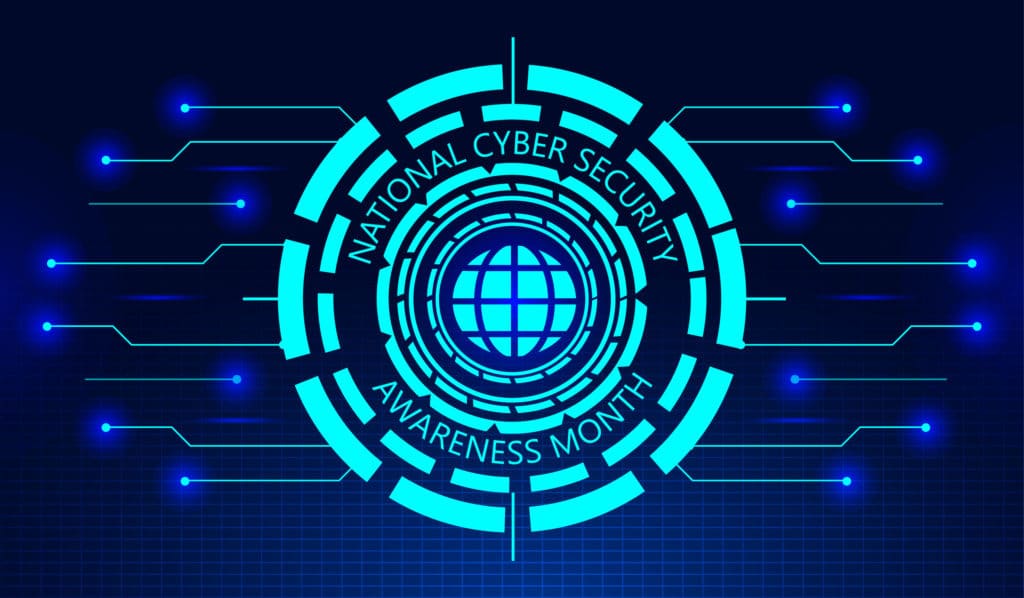
October is the time we have fun putting up scary decorations of ghouls, ghosts, and skeletons, but it’s also when we turn our attention to something else that’s very scary and very real – malware, password theft, and data breaches.
Welcome to Cybersecurity Awareness Month, a recognition put into place back in 2004, just as the internet was starting to heat up and get more dangerous.
This month is a great time to refresh any IT security initiatives that may have been put on the back burner and renew your employee awareness efforts.
Attacks are only getting worse and more costly, which means companies need to make an effort to avoid becoming cyberattack victims or face high costs. For example, the cost of the average ransomware ransom demand continues to rise and is now $234,000.
Good cybersecurity hygiene encompasses multiple security tactics that all work together to strengthen your defenses to protect your company data and network. It’s also something that everyone needs to be a part of. Just one weak link is all it takes to fall victim to a devastating attack.
Looking for a place to start?
We’ve gathered some of the best tips from the National Cybersecurity Awareness month site, below, to give you some best practices to get you going.
If You Connect It. Protect It.
It’s important to take responsibility for the IT security of devices that you connect to the internet. While PCs are usually top on the priority list to protect through solutions like managed IT services, other devices, like smart speakers or other IoT gadgets, aren’t well-protected at all.
It’s important to include smart devices in any IT security plan. This includes ensuring they have regular firmware and software updates and are given password protections like multi-factor authentication.
Pay Attention to Wi-Fi Security
An unsecured Wi-Fi connection can allow a hacker to move freely about your network, stealing data or planting malware.
It’s important to keep your network traffic monitored for threats by using an advanced firewall system.
You also need to think about the Wi-Fi used when employees are not at the office. Home Wi-fi should have safeguards as well, one of which could be creating a “guest” network and only using that for work devices.
The use of a VPN for remote and traveling employees also keeps connections secured even if on a public Wi-Fi network.
Provide Security Guidelines for Remote Employees
The remote workforce is a legacy of the pandemic that has forever changed the norm in how businesses operate. 80% of surveyed company leaders say they plan to allow employees to work remotely even after the pandemic has passed.
Surveyed workers echo this, with 80% of full-time employees expecting to work from home at least three or more days per week.
Remote teams can increase a company’s cybersecurity risk if they’re not properly guided on how to handle cybersecurity at their home offices. This includes device, data, and Wi-Fi best practices they should be using.
Learn the Basics of Phishing Detection
Phishing is still the number one danger to IT security because it’s how a vast majority of cyberattacks are delivered.
You should make the basics of phishing detection second nature for your team by providing training and resources that continue to reinforce tactics they can use.
The basics of phishing detection include:
- Hover over hyperlinks without clicking to see the URL.
- Check the message source code to see if it was sent from the email in the “From” line.
- Stop and stay if the email tries to use emotion or urgency to get you to react.
- Get a second opinion on unexpected emails from your IT security partner.
- Look at the domain and message carefully for any slight misspellings.
Keep All Apps & Software Up to Date
All devices (PCs, servers, mobile, and IoT) should have software and firmware updated regularly. Updates often include vital security patches to seal up newly found vulnerabilities that hackers are exploiting.
Treat Business Information Like It Is Your Personal Data
Most of us are careful about what we do with our personal credit card numbers. But might not show the same care when it comes to protecting a spreadsheet of business data.
But business data often includes sensitive information such as employee SSN’s, customer payment or banking information, trade secrets, and more.
You should emphasize that employees should treat business data as carefully as they do their own personal data because it can be just as sensitive.
Schedule an IT Security Review to Locate Any Potential Risks
It’s important to get an IT security review regularly because online threats are always evolving. Unity IT can work with your Fresno area business to audit your current safeguards and make any necessary recommendations needed to mitigate your risk.
Contact us today to schedule a technology consultation at 559-297-1007 or reach out online.

